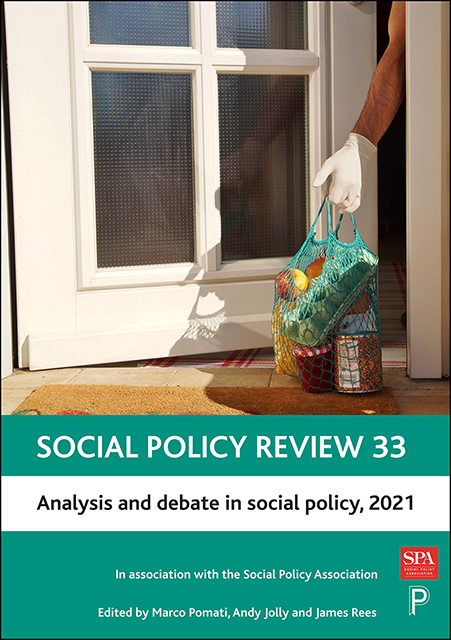Part I - COVID-19: responses and implications for social policy
Published online by Cambridge University Press: 14 April 2023
Summary
Governments around the world reacted in different ways and showed varying levels of preparedness to the COVID-19 pandemic. Yet they all had to reconsider assumptions about personal freedoms, social security, health and social care, childcare and education. This volume showcases examples of responses to the pandemic and their implications for social policy from a wide range of countries. Compared with previous volumes, this year's contributions are much more international and were written in the summer of 2020 in an ever-changing and uncertain landscape. They share a commitment to grasp some the most important issues highlighted by the pandemic, yet they can only do so with limited information. With time, the implications of COVID-19 will emerge in full, and the contributions in this volume are important for setting the research agenda of social policy for the years to come.
Chapter 1 by Nguyen, Breznau and Heukamp explores the relationship between public preferences around restrictions of personal freedom and governments’ ability to curtail social behaviours. They measure public preferences using a measure of public attitudes that predates COVID-19 and correlate this with an online poll data on risky behaviours such as attending social gatherings during the pandemic. Despite the very clear limitations of the data, which they explain, they provide clear and thought-provoking theories on the trade-off between government restrictions and public behaviour during the pandemic, and their interesting if tentative results will shape future contributions in this field.
Chapter 2 by Valadas is broad in scope, and sets out to examine the extent to which the COVID-19 pandemic, and earlier crises such as the global financial crisis of 2007–8, have accelerated the move towards a more coherent ‘Social Europe’. Providing detailed analysis of the social policies that have been put in place, particularly in relation to efforts to tackle job insecurity and extend welfare payment, and implement social rights, the chapter explores the nuanced policy and politics of the recent trajectory that, haltingly and sometimes painfully, seems to be moving the EU towards a more unified approach to social policy.
King-Hill, Greener and Powell bring together in Chapter 3 the literatures on policy learning and lesson-drawing with intra-crisis learning literature in order to examine three different sources of ‘learning lessons’ from overseas and the past in the COVID-19 pandemic; namely, the political, scientific and media lenses.
- Type
- Chapter
- Information
- Social Policy Review 33Analysis and Debate in Social Policy, 2021, pp. 1 - 4Publisher: Bristol University PressPrint publication year: 2021

